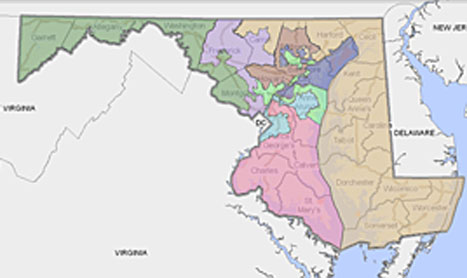ANNAPOLIS – The Maryland House of Delegates passed a Congressional redistricting bill Wednesday that drew criticism from both Republicans and Democrats, who said it dilutes minority voting power and ignores geographical and political lines.
The Congressional redistricting bill put forth by Gov. Martin O’Malley passed 91 to 46 in the House. The Senate approved the bill 33 to 13 on Tuesday. The bill will go back to the Senate on Thursday for approval of technical amendments, such as correcting typos.

The new Congressional districts would slice away the more conservative part of District 6, represented by veteran Congressman Roscoe Bartlett, R-Frederick, making it marginally more Democratic. If a Democrat is able to defeat Bartlett, Democrats would gain a seat in Congress and would hold seven of the state’s eight Congressional seats.
After the House vote, Bartlett issued a statement saying the new map does a poor job of representing minorities and rural residents. But he said the new map would not scare him into retirement.
“I filed for re-election in June and approval of this map hasn’t changed my plans to seek re-election to represent the residents of Maryland’s Sixth District in the U.S. House of Representatives,” he said, in the statement.
During the debate in the House, politicians from both sides of the aisle acknowledged the political reality of redistricting.
“I think it’s fair to say we expect some aspect of gerrymandering in any redistricting, but this takes it beyond the pale,” said Delegate Herbert McMillan, R-Anne Arundel.
Delegate Aisha Braveboy, D-Prince George’s, the chair of the Legislative Black Caucus of Maryland Redistricting Work Group, said the plan dilutes minority votes by breaking them up into several districts. She also believes Marylanders were not given enough of an opportunity to study the map.
“Collectively, we know this process is flawed and we have an opportunity to correct it,” said Braveboy, who voted against the plan.
Four new redistricting maps were introduced as amendments during Wednesday’s debate. Republicans introduced three of the maps that largely divided counties by geographical and political boundaries.
Delegate Ana Sol Gutierrez, D-Montgomery, introduced a map that changed the proposed districts in Montgomery County. All of the amendments failed.
Delegate Emmett C. Burns, Jr., D-Baltimore County, voted for the governor’s map but said that he felt conflicted between creating another majority-minority district and putting another Democrat in Congress.
“We have before us an interesting dilemma. I really am very pleased … that my friends are interested in the welfare of getting us to the majority-minority districts,” said Burns, referring to Republican opponents of the plan.
However, Democratic leaders felt that the new redistricting plan was fair to the voters of Maryland and supported minority interests.
House Majority Leader Kumar P. Barve told the assembly that no matter what type of plan is created, some people will be unhappy. He said that minorities are well represented and the districts are competitive. Barve believes the plan would survive any court challenge.
Barve also said that the geography of Maryland makes it difficult to make compact, neat districts like some of the big, square states.
“Some people have said it looks ugly, it doesn’t look good, but it’s not that fundamentally differently than the plan we have now … I don’t think this plan is going to fail constitutionally.”


You must be logged in to post a comment.